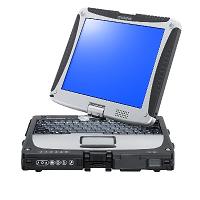
Rugged hardware is hardware that is specifically designed to endure extremely harsh environments and conditions, such as strong vibrations, extreme temperatures and wet or dusty conditions. Rugged laptops and computers are essential business tools for any mobile workforce, from those who work in the construction industry to those in the military and of course, many other lines of work where high quality and durable equipment is required.
Typically, rugged devices will incorporate features such as fully sealed keyboards to protect against intrusion by dust or liquids, and scratch-resistant screens that are readable in direct sunlight. Rugged units are more expensive in terms of annualized hardware costs, however, one research study found that in environments where rugged computers are commonly used, total cost of ownership was 36 percent lower for rugged notebooks and 33 percent less for handhelds and PDAs, compared to conventional non-rugged versions. The lower overall cost is due to lower failure rates, the related impact on productivity, and many other factors.
In terms of the classification of rugged devices, there are three generally accepted categories:
● Semi-rugged devices: Usually enhanced versions of commercial off-the-shelf hardware (COTS). The components are the same, but they are protected better.
● Fully-rugged devices: Designed from the inside-out to work in extreme temperatures, to be impervious to being dropped, to resist shocks and vibrations and to be dustproof and waterproof.
● Ultra-rugged devices: Designed to meet precise specifications for military use, are made to handle the harshest environmental conditions. An ultra-rugged laptop can be left out in a sandstorm or frozen in a blizzard.
Different rugged devices will have different quality standards. For example, MIL-STD-810F (Military Standard) establishes a set of tests for determining equipment suitability to military operations. It includes testing protocols to simulate environmental stresses from rain, humidity, salt fog, sand/dust, vibration, shock, temperature, etc.It is an all-encompassing standard that is often used for ruggedization testing by mobile computer manufacturers.
Furthermore, there is the Ingress Protection (IP) Certification that is used to classify the degrees of protection provided by electrical enclosures from dust, water and impact. Higher numbers indicate a higher tolerance to dust and water e.g. a unit with an IP65 certification will withstand exposure to dust and water better than a unit with an IP54 certification. Thus,if you are looking for high quality fully rugged hardware, it is vitally important to look out for these two types of quality standards when purchasing.